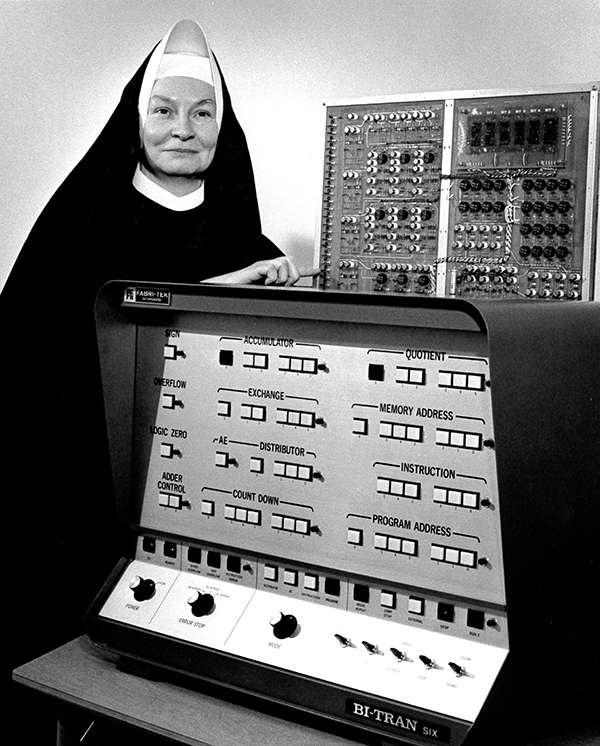
“For the first time, we can mechanically model the process of cognition” - Sister Mary Kenneth Keller.
Sister Mary Kenneth Keller made a powerful impact on the world of Computer Science at a time when women in the field were unimaginable. Her work paved the way for what we now call the information economy - a key driver of the market. She was the first woman in the United States to receive a PhD in computer science and later helped develop the BASIC programming language that changed the world of computer science.
Little is known about Keller's early life. She was born on December 17, 1913 in Cleveland, Ohio, to John Adam Keller and Catherine Josephine (née Sullivan). In 1932, she followed God's call to the Sisters of Mercy of the Blessed Virgin Mary in Dubuque, Iowa, and in 1940 she took a vow with parishioners. She then began her academic career in Chicago, earning her BA in mathematics and an MA in mathematics and physics from DePaul University in 1943 and 1953, respectively.

In 1958, Keller began working at the National Science Foundation workshop at the Computer Science Center at Dartmouth College, which was a men's school at the time. There she worked with John G. Kemeny and Thomas E. Kurtz to develop the BASIC programming language.
BASIC revolutionized programming by enabling anyone who could learn the language to write their own software. Before BASIC, only mathematicians and scientists could do this. Different versions of BASIC became widespread on the first personal computers in the 1970s and 1980s, allowing everyone (from business owners to computer hobbyists) to develop software.
Throughout her graduate studies, Keller was associated with several other prestigious institutions in addition to the University of Dartmouth, including the University of Michigan and Purdue. In 1965, Keller received her PhD in Computer Science from the University of Wisconsin at Madison. Her thesis was titled "Inductive Inference on Computer Generated Patterns" (in CDC FORTRAN 63).
Keller founded the Computer Science Department at Clark College, a Catholic college for women founded by the Sisters of Mercy of the Blessed Virgin Mary. She headed the department for 20 years, where she was an advocate for women in computer science. She was noted for her support of working mothers and even encouraged mothers to take their children with them to class.

Keller was one of the first to recognize and appreciate the vast role that computers will play in the world. In 1964, she noted that students in fields such as psychology and natural sciences were already using computers in their academic work. She advocated for the use of computers in education and established a Master's program in Computer Applications in Education at Clark. She also predicted the value computers will have in libraries, saying that "their function in finding information will make them the heart of the libraries of tomorrow."
Keller was enthusiastic about the idea of giving access to computers to everyone, not just computer scientists. “We are living in an era of information explosion,” she said, “and it is certainly clear that information is useless if there is no access to it.”

In her honor, Clark University (formerly Clark College) established the Mary Kenneth Keller Fellowship in Computer Science and the Keller Computer Center, which provides computing and telecommunications support to staff, faculty, and students at Clark University. Keller died at the age of 71 in Dubuque, Iowa on January 10, 1985.

Learn more about how to get a high-profile profession from scratch or Level Up in skills and salary by taking SkillFactory's paid online courses:
- Training the Data Science profession from scratch (12 months)
- Analyst profession with any starting level (9 months)
- Machine Learning Course (12 weeks)
- Course "Python for Web Development" (9 months)
- DevOps course (12 months)
- - (8 )
- Data Sciene 2020
- Data Science . Business Science
- Data Scientist
- Data Scientist -
- 450
- Data Science : «data»
- Data Sciene : Decision Intelligence